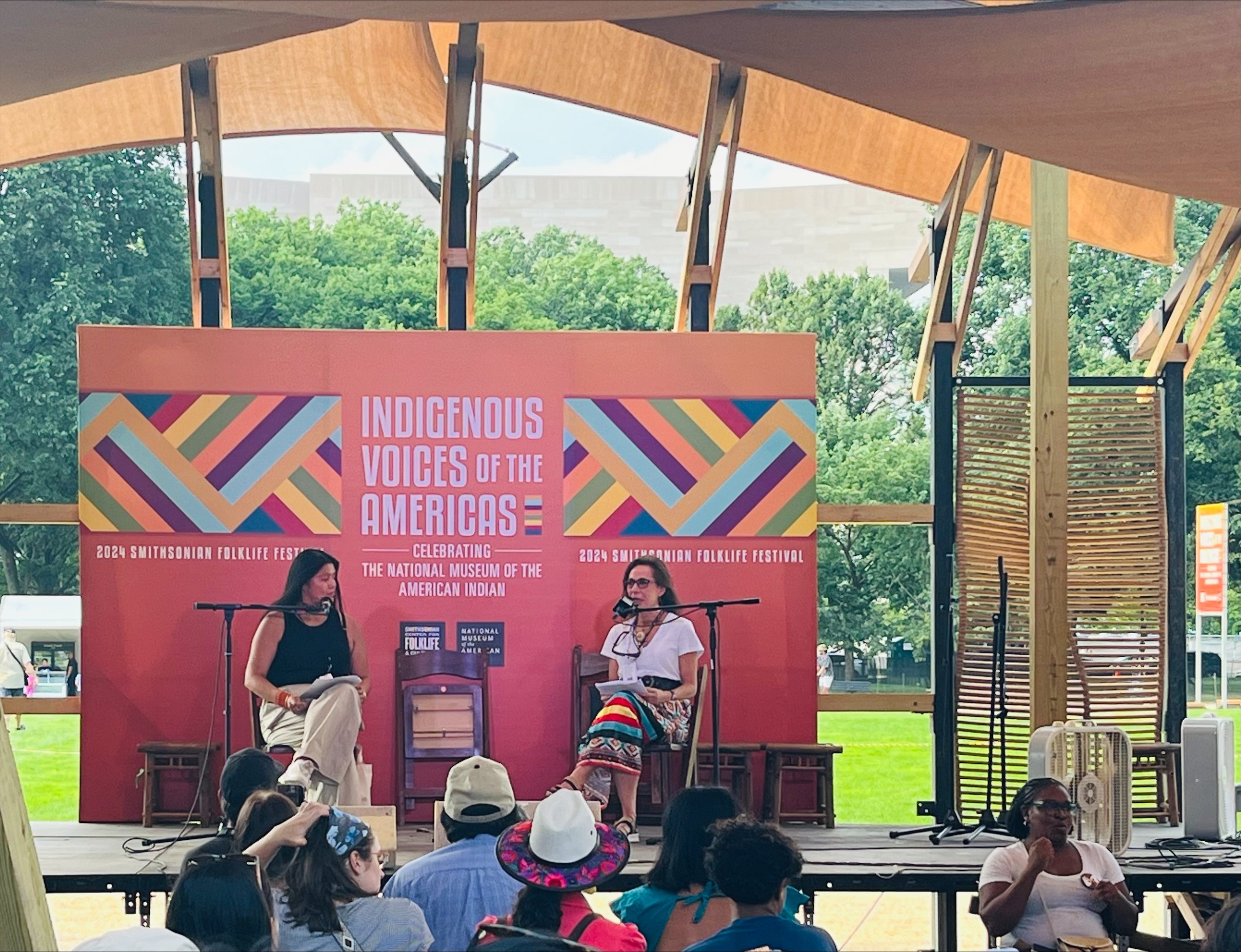Indigenous Justice Circle at the 2024 Smithsonian Folklife Festival
Every year, the Smithsonian Folklife Festival organizes a public event at the National Mall in Washington D.C. to highlight “living cultural heritage.” This year, the festival was organized around a celebration of the 20th anniversary of the Smithsonian National Museum of the American Indian. The theme of the festival was Indigenous Voices of the Americas: Celebrating the National Museum of the American Indian, and it showcased the living traditions of Indigenous peoples, including culinary traditions, music, visual arts, sports, and conversations. It was an honor for the Indigenous Justice Circle to be invited to participate at this incredible event.
Kelly Hallman at the Folklife Festival. (Photo courtesy of Kelly Hallman).
IJC Founder and Executive Director, Dr. Kelly Hallman (Cherokee Nation, she/her), and Media & Communications Consultant, Kassel Garibay (she/her), joined the festival from June 29 to July 1st to share information about the transnational Missing and Murdered Indigenous Women, Girls, and Two-Spirit (MMIWG2S) crisis, its historical roots, and what can be done to combat it.
During the panels, Hallman shared a family story about the Cherokee Trail of Tears from Georgia to Oklahoma, a poignant example of the forced displacement of Native communities and how it disproportionately affected young Indigenous girls. Through a chronological narrative of how colonization and forced assimilation policies attempted to shift Native women’s roles from communal and shared to the private and individual, Hallman located the roots of the ongoing MMIWG2S crisis in the erosion of Native women and 2SLGBTQ+ rights, including the formally recognized ceremonial, economic, judicial and legal positions women held before contact with European cultures.
“Indigenous Justice Circle’s mission is to work with Native communities to reweave the social fabric and matrilineal safety networks that were once strong and protective of women, children and Two-Spirit people,” said Hallman. “The best part of participating in the Folklife Festival for me was having a platform to explain how systematically the MMIWG2S crisis came about over time and how, with a purposeful plan, it can be reversed. After my talks, people approached me and said they had never been taught the history behind the crisis and felt enlightened to know it.”
Kelly Hallman on stage at the Folklife Festival. (Photo courtesy of Kathy Hall)
During the panel, Garibay brought in a Meso-American decolonial gender studies perspective that traces the binary division of gender to colonial efforts to dismantle Indigenous cultures and societies. Through the imposition of a male/female gender binary that robbed Two-Spirit people of their roles, colonial powers succeeded in unraveling important kinship systems that worked for Indigenous communities for centuries. The consequences of this weakening include the erosion of social networks that act as protective mechanisms to prevent domestic violence, human trafficking, and other forms of sexual and gender-based violence (SGBV).
“To me, the most meaningful part of participating at the Folklife Festival was connecting with 2SLGBTQ+ youth from different places after our panels,” said Garibay. “It was an honor for me to be able to amplify queer voices and bring attention to the fact that Two-Spirit, trans, and non-binary youth are particularly at risk when it comes to SGBV and mental health. I am glad that I could be there to facilitate those conversations.”
Through conversations with the public, it became clear that people are interested in the intersections between environmental justice, economic literacy, political participation, and gender transformative justice. Although MMIWG2S is a complex topic, this also means there are different ways for people of different expertise to get involved in making a change. The work of IJC in preventing and responding to the crisis is supported by the leadership of different people around the world. Participating at the 2024 Smithsonian Folklife Festival was an excellent way of growing our network and connecting with other people determined to make a change.
Scenes from the festival. (Photos courtesy of Kassel Garibay)
The talks by Hallman and Garibay were recorded and will be soon made available as part of the Ralph Rinzler Folklife Archives and Collections. We look forward to sharing them with you!






